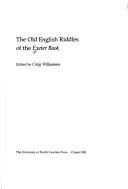| Listing 1 - 5 of 5 |
Sort by
|
Book
ISBN: 0812278437 Year: 1982 Publisher: London ; New York, NY ; Rheine : University of Pennsylvania. University Museum,
Abstract | Keywords | Export | Availability | Bookmark
 Loading...
Loading...Choose an application
- Reference Manager
- EndNote
- RefWorks (Direct export to RefWorks)
English poetry --- Riddles, English (Old) --- Songs, English (Old) --- Modernized versions. --- Texts. --- Riddles, English (Old). --- OLD ENGLISH, ca. 450-1100 --- RIDDLES

ISBN: 0807812722 Year: 1977 Publisher: Chapel Hill : University of North Carolina Press,
Abstract | Keywords | Export | Availability | Bookmark
 Loading...
Loading...Choose an application
- Reference Manager
- EndNote
- RefWorks (Direct export to RefWorks)
Book
ISBN: 0812248473 0812293215 Year: 2017 Publisher: University of Pennsylvania Press, Inc.
Abstract | Keywords | Export | Availability | Bookmark
 Loading...
Loading...Choose an application
- Reference Manager
- EndNote
- RefWorks (Direct export to RefWorks)
Book

ISBN: 1283897067 081220445X 0812211294 Year: 2011 Publisher: University of Pennsylvania Press
Abstract | Keywords | Export | Availability | Bookmark
 Loading...
Loading...Choose an application
- Reference Manager
- EndNote
- RefWorks (Direct export to RefWorks)
In A Feast of Creatures, Craig Williamson recasts nearly one hundred Old English riddles of the Exeter Book into a modern verse mode that yokes the cadences of Aelfric with the sprung rhythm of Gerard Manley Hopkins. Like the early English riddlers before him, Williamson gives voice to the nightingale, plow, ox, phallic onion, and storm-wind. In lean and taut language he offers us mead disguised as a mighty wrestler, the sword as a celibate thane, the silver wine-cup as a seductress, the horn transformed from head-warrior to ink-belly or battle-singer. In his notes and commentary he gives us possible and probable solutions, sources, and analogues, a shrewd sense of literary play, and traces the literary and cultural contexts in which each riddle may be viewed. In his introduction, Williamson traces for us the history of riddles and riddle scholarship.
English poetry --- Riddles, English (Old) --- Anglo-Saxon riddles --- English riddles, Old --- Old English riddles --- Riddles, Anglo-Saxon --- Riddles, Old English --- Anglo-Saxon poetry --- English poetry, Old --- Old English poetry
Book

ISBN: 1283897253 0812204409 081222275X 0812243455 Year: 2011 Publisher: University of Pennsylvania Press
Abstract | Keywords | Export | Availability | Bookmark
 Loading...
Loading...Choose an application
- Reference Manager
- EndNote
- RefWorks (Direct export to RefWorks)
The best-known literary achievement of Anglo-Saxon England, Beowulf is a poem concerned with monsters and heroes, treasure and transience, feuds and fidelity. Composed sometime between 500 and 1000 C.E. and surviving in a single manuscript, it is at once immediately accessible and forever mysterious. And in Craig Williamson's splendid new version, this often translated work may well have found its most compelling modern English interpreter.Williamson's Beowulf appears alongside his translations of many of the major works written by Anglo-Saxon poets, including the elegies "The Wanderer" and "The Seafarer," the heroic "Battle of Maldon," the visionary "Dream of the Rood," the mysterious and heart-breaking "Wulf and Eadwacer," and a generous sampling of the Exeter Book riddles. Accompanied by a foreword by noted medievalist Tom Shippey on Anglo-Saxon history, culture, and archaeology, and Williamson's introductions to the individual poems as well as his essay on translating Old English, the texts transport us back to the medieval scriptorium or ancient mead hall to share an exile's lament or herdsman's recounting of the story of the world's creation. From the riddling song of a bawdy onion that moves between kitchen and bedroom, to the thrilling account of Beowulf's battle with a treasure-hoarding dragon, the world becomes a place of rare wonder in Williamson's lines. Were his idiom not so modern, we might almost think the Anglo-Saxon poets had taken up the lyre again and begun to sing after a silence of a thousand years.
Epic poetry, English (Old) --- Dragons --- Monsters --- Anglo-Saxon epic poetry --- English epic poetry, Old --- Epic poetry, Anglo-Saxon --- Old English epic poetry --- English poetry --- History and criticism. --- Beowulf --- Bjowulf --- Scandinavia --- Cultural Studies. --- Literature. --- Medieval and Renaissance Studies. --- Poetry.
| Listing 1 - 5 of 5 |
Sort by
|

 Search
Search Feedback
Feedback About UniCat
About UniCat  Help
Help News
News